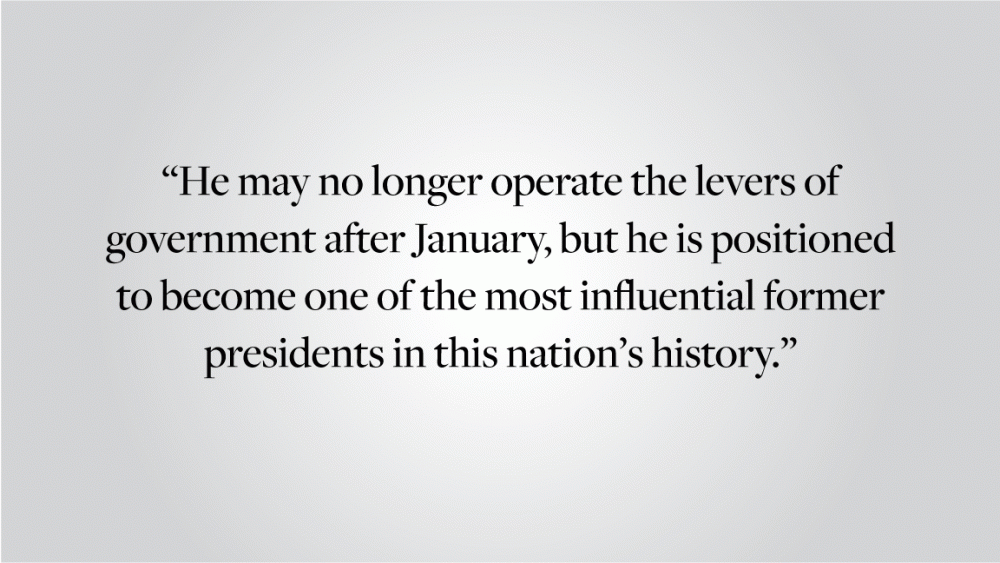If President Donald Trump is defeated in this election, he is going to leave office. Despite what some alarmists in the New York Times might say, he will not try to retain power; there will be no coup d’état. Sure, he might say the election was rigged. That, if not for voter fraud and those pesky mail-in-ballots, he’d have won “BY NUMBERS NO ONE HAS EVER SEEN BEFORE.” He may even contest the results in the courts. But if Joe Biden is certified the winner, Trump, perhaps guided by nothing other than optics and self-preservation, will go.
And if he loses, come next January, he will become the newest ex-president of the United States. Then, the question for Trump is: “Now what?” Historically, former presidents have done lots of different things. George Washington operated one of the nation’s largest whiskey distilleries. William Howard Taft became the Chief Justice of the United States Supreme Court. Jimmy Carter won the Nobel Peace Prize.
Ordinarily, presidents use their post-presidency to tackle some big challenge. As a result, they stay in the spotlight for a while. But for whatever reason — perhaps because no one can imagine Trump with a hard hat and a toolbelt building houses for Habitat for Humanity — the conventional wisdom, and perhaps wishful thinking, is that a Trump defeat will be the end of his time in the limelight. But we need to face reality: Trump may lose, but he will never go away. He may no longer operate the levers of government after January, but he is positioned to become one of the most influential former presidents in this nation’s history.
The sky is blue, the earth is round and Donald Trump needs attention. Few things are more certain than these — they are true now, probably always were and undoubtedly always will be. Normally, it wouldn’t matter, but if Trump leaves office in a few months, he won’t be leaving empty-handed. He’ll have amassed a five-years-in-the-making following of red-hatted supporters, and you’d bet he’s going to parlay that into something.
In 2016, multiple outlets reported that then-Trump adviser Steve Bannon had flirted with the idea of launching a conservative media company with Trump in the event he lost the election. He won, so it was not to be, but if Trump is looking for cash (and a microphone) after he leaves office, he might try to revive the idea. In that case, it will be that much harder for Republicans who are looking to drop Trump as fast as possible — as they’ve already started to do — particularly if he becomes some Sean-Hannity-on-steroids-type presence in the conservative media ecosystem.
In the absence of a clear Republican leader to take up the mantle, a post-presidency Trump may remain the Republican kingmaker he has been these past four years. Rush Limbaugh’s radio show attracts some 15 million listeners per week. By comparison, Trump received 14 million votes in the 2016 Republican primary. If Trump’s post-presidency megaphone is even close to as big, Trump will continue to shape Republican Party politics long after he leaves the White House.
Finally, we also have the Teddy Roosevelt case. If Trump loses next week, then we could be in for another round of insanity if he tries to run again in 2024. Is it likely? No. In fact, my gut tells me it’s highly unlikely. But here’s why you can’t dismiss it.
Imagine Trump leaves office, goes back on TV (on his own network, Fox or somewhere else), remains popular with his base and then, in 2023, a poll comes out showing he’s leading a divided Republican field with 25 percent of the vote. Tell me you’re certain he wouldn’t run. For those of you who are certain, were you also certain that he wouldn’t run in 2016 when he was just a reality TV star and polling toward the bottom of the field? It seems entirely plausible that, after a few years out of politics, Trump might enter the race to defeat the man who defeated him. Or he might enter because he misses his rallies. Or he may just be bored. And sure, he may be 78, but he’ll still be four years younger than Biden.
Believe me, I take no pleasure in saying this. I have Trump fatigue as much as anyone. But some 30 percent of the country is fiercely loyal to him, and that’s not going to change based on the results on Election Day. Odds are, Trump will lose this election. He may have beaten those odds in 2016, but he’s still the underdog. And you can bet that if he does lose, he’ll be looking for some new attention-grabbing scheme. Sure, we may hear from him less. But with Trump, less is still too much.
Andrew Reed ’21 can be reached at andrew_reed@brown.edu. Please send responses to this opinion to letters@browndailyherald.com and op-eds to opinions@browndailyherald.com.

ADVERTISEMENT




